





How many calories in egg
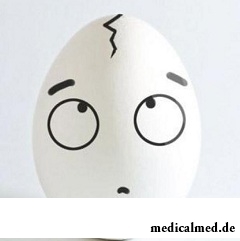 It is important to know the caloric content of products for all growing thin. All diets in a varying degree urge us to control energy value of food. As eggs are a part of a standard diet of all Russians, and a question how many calories in egg interest many. It should be noted that nutritionists have a relation to this product ambiguous. Someone recommends eggs for weight loss. On their basis, for example, the power supply system of the endocrinologist Osama Hamdy is created. Other doctors advise strictly to limit amount of eggs in food. Regularly recommendations to reduce their consumption to two pieces a week sound. In this article we will try not only to answer how many calories in egg and eggs dishes, but also to discuss expediency of inclusion of these products in the menu at fight against excess weight.
It is important to know the caloric content of products for all growing thin. All diets in a varying degree urge us to control energy value of food. As eggs are a part of a standard diet of all Russians, and a question how many calories in egg interest many. It should be noted that nutritionists have a relation to this product ambiguous. Someone recommends eggs for weight loss. On their basis, for example, the power supply system of the endocrinologist Osama Hamdy is created. Other doctors advise strictly to limit amount of eggs in food. Regularly recommendations to reduce their consumption to two pieces a week sound. In this article we will try not only to answer how many calories in egg and eggs dishes, but also to discuss expediency of inclusion of these products in the menu at fight against excess weight.
How many calories in eggs of different grades
Most often in food we use eggs (perfect, ordinary or small) and quail eggs. How many calories in egg depend on its grade. Let's review specific examples. Selected egg weighs about 60 grams. Its caloric content makes 94-100 kilocalories. Ordinary egg happens weighing 50-60 grams. Its caloric content is about 78-85 kilocalories in one piece. Small eggs weigh less than 50 grams. Their caloric content per piece 63-77 kilocalories. You can learn a grade of chicken dietary egg having studied the label on packaging. Of course, only the laboratory research can establish true caloric content. The data provided by us average also fluctuate seasonally, breeds of a bird, her age, structure of forages on poultry farm. In 100 grams of any egg about 157-160 kilocalories. In 100 grams of quail egg of calories it is even more – about 168-170. But eggs of this grade much more small. Their weight is about 9-12 grams. How many calories in egg of this species of a bird? No more than 20 kilocalories in one piece. Less often in food other types of eggs are used. Duck or goose egg contains 185 kilocalories in 100 grams, an indyushachya – 165 kilocalories, ostrich's – 118 kilocalories. How many calories in egg, depend first of all on its weight.
Caloric content of ovalbumins and yolks
In egg it is possible to allocate two parts accurately: egg white and yolk. Their structure cardinally differs on the content of proteins and fats, and also calories and microelements. Those who uses eggs for weight loss should know these distinctions. The yolk is rich with full-fledged animal protein, fat and cholesterol. In its structure about 11,5% of fats. Cholesterol in one yolk of 210 mg. Of course, those who struggle with atherosclerosis are forced to refuse an egg yolk almost completely. But if you have no expressed problems with vessels, then completely you should not refuse this product. In a yolk there is a mass of useful substances: complex omega-3, calcium, folic acid, vitamin D. Caloric content of each chicken egg yolk is equal to about 55-65 kilocalories. Protein has absolutely other nutritious properties. It consists of carbohydrates and proteins (albumine). In protein there are practically no fats and cholesterol, so, it will not be harmful even at the most rigid diet. On energy value this product can be carried to low-calorie. Caloric content of ovalbumin is only 15-20 kilocalories. If to speak about 100 grams of a product, then for a yolk caloric content makes 352 kilocalories, and for protein – only 45 kilocalories.
Caloric content of soft-boiled egg and hard-boiled
As culinary processing, egg it is the simplest to weld. Time of boiling defines whether there will be this soft-boiled egg or hard-boiled. Product caloric content almost identical in both cases. Caloric content of hard boiled egg makes 160 kilocalories on 100 grams. Soft-boiled egg caloric content almost as much – 157-159 kilocalories on 100 grams of a product. The longer egg was exposed to heat treatment, the more time will be necessary for its digestion in digestive tract. Besides, eggs, the prepared hard-boiled, can longer be stored. Comprehensibility of useful substances anyway remains high.
Calories in fried egg
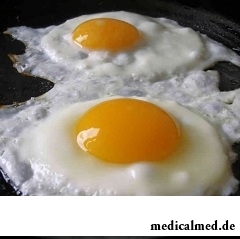 Fried eggs are much more caloric crude or boiled. It is connected with the fact that at this way of cooking fat is used (vegetable or butter). All oils are extremely caloric products. Vegetable oil (including olive) is considered the champion on caloric content. It contains about 900 kilocalories in 100 grams. It so is a lot of that significantly exceeds energy value of mayonnaise, fat, chocolate and sugar. Fried eggs contain 240 kilocalories in 100 grams. It is one third more, than in crude or boiled eggs. The omelet prepares from eggs with addition of milk, cream, torments, cheese. Its caloric content can make 200-350 kilocalories. Calories in fried egg most often are superfluous at any power supply system.
Fried eggs are much more caloric crude or boiled. It is connected with the fact that at this way of cooking fat is used (vegetable or butter). All oils are extremely caloric products. Vegetable oil (including olive) is considered the champion on caloric content. It contains about 900 kilocalories in 100 grams. It so is a lot of that significantly exceeds energy value of mayonnaise, fat, chocolate and sugar. Fried eggs contain 240 kilocalories in 100 grams. It is one third more, than in crude or boiled eggs. The omelet prepares from eggs with addition of milk, cream, torments, cheese. Its caloric content can make 200-350 kilocalories. Calories in fried egg most often are superfluous at any power supply system.
Egg powder
Caloric content of egg powder extremely high. This product contains about 542 kilocalories in 100 grams. Of course, we never eat this product in a large number and in pure form. Otherwise soon the problem of obesity was particularly acute for all of us. Caloric content of ovalbumins and yolks in a dry form too strongly differs. In 100 grams of dry protein about 336 kilocalories. It is a lot of, but after all it is significantly less, than in dry yolks. Their caloric content – nearly 625 kilocalories in 100 grams.
Eggs for weight loss
In some diets eggs for weight loss are used. First of all it is about low-carbohydrate diets. Such diets are based on modern ideas of a metabolism. At an exception of carbohydrates, we start processes of a lipolysis. As a result in blood there are ketonic bodies promoting appetite suppression. In low-calorie diets of egg can be quite used too. Caloric content of hard boiled egg and soft-boiled allows to consider these products dietary. Their energy value for one portion small. And the feeling of saturation comes for a long time. Eggs belong to sources of valuable vitamins and microelements. At what these substances are acquired from eggs very well. On 100 grams contains in egg: phosphorus – 192 milligram, potassium – 140 milligrams, sodium – 134 milligram, calcium – 55 milligrams, magnesium – 12 milligrams, gland – 2,5 milligram, copper – 83 microgram, cobalt – 10 micrograms. All these substances are especially necessary for maintenance of health by that who constantly fights against excess weight by means of various unbalanced diets. However, abuse of eggs can lead to undesirable effects. Especially it concerns those whose level of cholesterol according to biochemistry of blood exceeds normal values. Therefore eggs for weight loss should be used only in good analyses of biochemistry of blood.
Even if heart of the person does not fight, then he all the same can live during a long period, as the Norwegian fisherman Jan Revsdal showed us. Its "motor" stopped for 4 hours after the fisherman got lost and fell asleep in snow.

Season of activity of viral infections in the heat. Everyone can get sick, but probability of this unpleasant event it is possible and it is necessary miny...
Section: Articles about health
The sudden heat on all body which is followed by perspiration and a cardiopalmus – the phenomenon familiar to many people. Most often such states called by "inflows" result from nervous or physical overworks and disappear right after rest. Odn...
Section: Articles about health
Life of the modern woman is very difficult. Opportunities to realize itself are wide: it not only education and career, but also the most various hobbies from sport before needlework. It is not less important to build private life, paying an attention maximum to children, the husband, parents, friends. For all these affairs there is catastrophically not enough time therefore each of us tries to cut down as far as possible its expenses on necessary, but not the most fascinating housework. With it we are successfully helped by means...
Section: Articles about health
Nightmares belong to the most unpleasant frustration. Statistically, they happen at 4% of adults, and almost at 70% of children and...
Section: Articles about health
Popular joke that there are no healthy people, and is nedoobsledovanny, most of us considers an honest truth, continually it is necessary to hear that all of us are sick hardly from a school bench. It is hard to say, whether so it actually because...
Section: Articles about health
Dogrose – one of the most widespread adornment and medicinal plants growing practically in all territory of our country. To most of Russians it is a beautiful bush it is known, first of all, as a source of fruits, extremely vitamin-rich. However curative properties of a dogrose are not limited to it at all. About how still it is possible to use a plant in the medical purposes, we will tell today....
Section: Articles about health
Musicotherapy – a treatment method which caused and causes a set of a controversy concerning its efficiency. However the facts are relentless:...
Section: Articles about health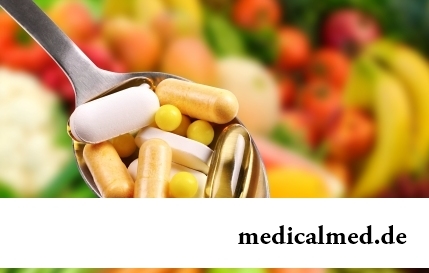
The medicine promptly develops, and the fact that else quite recently it seemed by miracle can now. We are not surprised any more to the fact that people with artificial joints and extremities can play sports, organ transplantation became a routine, and the latest cancer medicine п...
Section: Articles about health
The popular expression "run from a heart attack" became the motto of the people supporting active lifestyle. Moreover, run became a peculiar fashionable tendency: sales of racetracks and the accompanying goods for run are at permanently high level. Whether really it is possible for one and all people and it is necessary to run to receive the portion of health, a charge of cheerfulness and good mood?...
Section: Articles about health
Statistically, in Russia about 34% of citizens smoke. Most of consumers of tobacco has problems about health sooner or later...
Section: Articles about health
The number of long-livers is very small. One person from 5 thousand lives up to age of 90 years, and the centenary boundary steps over only one of 20 thousand. However, doctors claim that each of us is quite able to affect own destiny. At the same time speech to Ida...
Section: Articles about health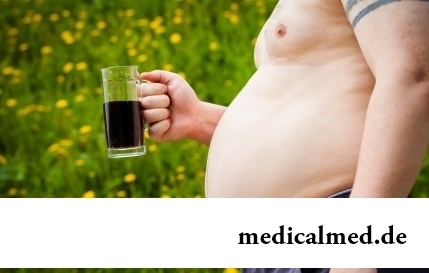
There is a lot of fans of beer in our country. Statistically, on each average Russian (including women and children) in a year about 60 liters of this drink are consumed. It is not a lot of, as in the Czech Republic or Germany, but figure all the same impressive. There is nothing to rejoice here: despite assurances of producers that beer is absolutely harmless, effects of its active consumption cannot be considered positive in any way. Here only part of that negative impact, which popular нап...
Section: Articles about health
The summer of this year in Russia was very ambiguous. Regions suffered from a merciless heat, from pouring rains, from times...
Section: Articles about health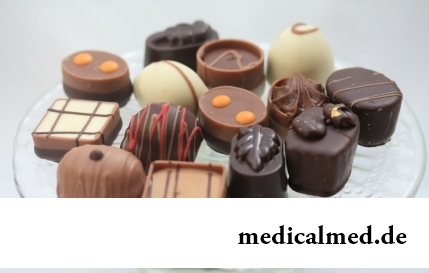
Urogenital candidiasis (milkwoman) – a fungal infection which annoys unpleasant feelings in the field of generative organs, being followed by white curdled allocations, an itch, discomfort during an urination, pain. She is called by Candida fungus – a mustache...
Section: Articles about health
Phobia – the persuasive fear of a certain contents shown in a specific situation against the will of the person. Concepts of a phobia and fear are similar, however if the fear is natural protective function of mentality, then the phobia is its deviation. So the person can feel the unaccountable, baseless fear accompanied with neurotic symptoms (perspiration, a shiver, a fever) before any ordinary phenomenon – for example, a trip by the subway or a simple dog....
Section: Articles about health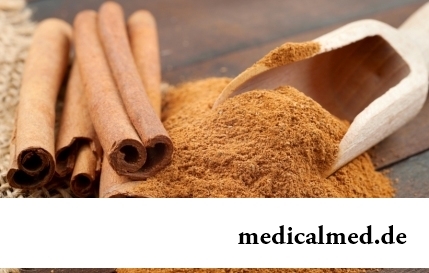
Ayurveda - the most ancient tselitelsky practice which came to us from India. It represents the doctrine about maintenance physical, ps...
Section: Articles about health
More than a half of the married couples which faced prostatitis – leave. The new broadcast "Female View of Prostatitis" will help to learn – whether you have or your relatives problems....
Section: Articles about health
Life of the modern child is extremely active and difficult. Information strain which is experienced by the school student and did not dream pupils of last times. Careful parents, wishing well to the children, will organize a set of additional classes in circles, sports sections and music schools. In such situation the child needs continuous care and good nutrition to keep health and high performance....
Section: Articles about health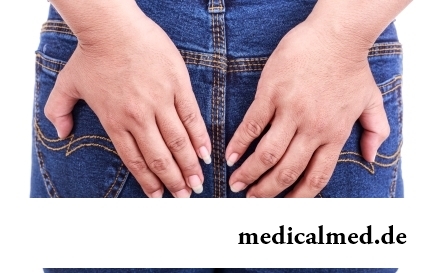
Hemorrhoids – extremely widespread disease. Periodically arising inflammations and bleeding of hemorrhoidal nodes пр...
Section: Articles about health
Bathing in broths of medical flowers and plants (phytobathtub) was eurysynusic since Cleopatra who is a good judge in all that concerns beauty and health. And today phytobathtubs is the simple and available means allowing not only to remove nervous N...
Section: Articles about health
Physical activity is necessary for normal functioning of a human body. At a lack of the movement joints cease to function, muscles atrophy, cardiovascular activity is broken and the metabolism worsens. The modern city rhythm of life does not provide the person with an adequate exercise stress, additional - sport is necessary. Tedious tasks the huge number of the people having those or ин exists sport not all to liking, but also...
Section: Articles about health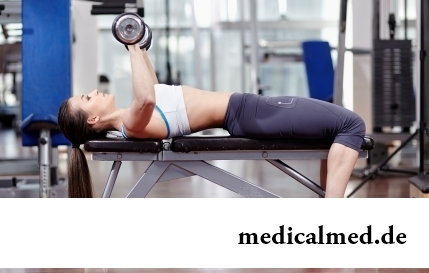
Women quite often suffer from complexes concerning the sizes of the bust. Strangely enough, reason душевног...
Section: Articles about health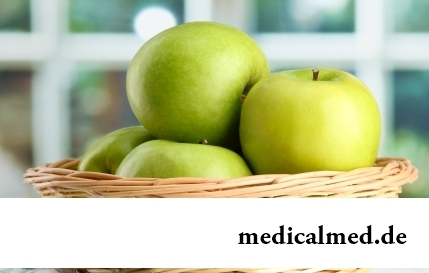
For most of the working people the problem of having a snack is particularly acute enough. Sooner or later there is a question: what can be eaten quickly between a breakfast and a lunch or a lunch and leaving from service so that to receive necessary power feed, but not an overload...
Section: Articles about health
Since the moment when the child becomes a school student, his sight begins to be exposed to the strengthened loadings which are supplemented with viewing of animated films and long computer games. During this period of life of the child development of not completely created organs of sight, it is very easy to break the excessive loading which is aggravated with lack of a work-rest schedule. As a rule, and occurs: according to WHO statistics, every fourth child of school age has these or those diseases of eyes, Wednesday...
Section: Articles about health
For the city dweller the fitness is the most convenient sport. It is enough to acquire the subscription to the gym to receive to a toast...
Section: Articles about health
You heard that laughter prolongs life? Researchers did not manage to establish longevity direct link with sincere fun yet, but several facts confirming beneficial influence of risibility on the state of health are clinically proved....
Section: Articles about health
Childbirth is the most important event in life of each woman. We are women we give birth to the new little man on this light. Now the tendency to that was outlined, as men want to participate in labor too. But there is a question and whether it is worth allowing the husbands on childbirth?...
Section: Articles about health
